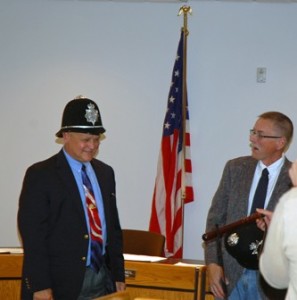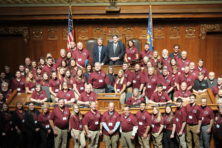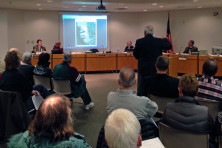Brits Descend on Council
- Share
- Tweet
- Pin
- Share

Sturgeon Bay Mayor Thad Birmingham, right, reacts to Sturgeon Bay Police Chief Arleigh Porter donning an English “Bobby” hat. Both men were presented with official Bobbie hats by a group of English police officers in an exchange program through the criminal justice program at NWTC.
Sturgeon Bay Police Chief Arleigh Porter and Mayor Thad Birmingham are now proud owners of custodian helmets, the official name of the headgear worn by English patrol officers.
The helmets were presented at the Sturgeon Bay Common Council meeting on June 2, with several members of English police forces on hand for the presentation. In reciprocity, Birmingham read proclamations honoring the individual English police officers, who were here to attend the International Police Association (IPA) Conference that was held all week at the Green Bay campus of Northeast Wisconsin Technical College.
“The guys that were here from the UK and their wives, it’s a working holiday for them,” Porter said. “Two of them had been here before. They’re attending the conference in Green Bay, but they asked to stay up here in Door County. Part of it is just the way Door County is, the friendliness of it, everything about Door County. They picked up on that a few years ago and said, we want to go to the conference but we really want to stay in Door County.”
Lori Suddick, vice president of learning at NWTC, said the conference included about 40 attendees from the UK, Trinidad and Canada.
“NWTC put in a proposal to be the host this year,” she said. “They’ve been talking about active shooters, so we had people from the Oak Creek Police (where in 2012 police had to deal with a white supremacist who attacked a Sikh temple, killing six and wounding four others before shooting himself in the head), tactical emergency medical training, terrorism from the UK perspective, tactical and simulator training, a host of topics that are being covered throughout the week.”
She said the relationship with the British officers came about largely through NWTC Criminal Justice Instructor John Flannery, who is a member of the IPA.
“NWTC, through that connection, began a relationship with UK police officer Simon Hawkins (superintendent of the Hertfordshire Constabulary) and became connected with Hertford Regional College,” Suddick said. “We’ve had an ongoing relationship with Hertford Regional College, getting to know each other for about a year and half.”
In January, Flannery and Anne Oestreicher of NWTC’s paralegal faculty, took a group of 20 paralegal and criminal justice students to the UK and worked with Hawkins’ police force in Hertford.
Those students were recognized in a ceremony held at the NWTC campus this week for helping a woman who suffered a seizure while on the subway (or Tube) in London.
During the first week of May, Suddick traveled to Hertford Regional College to talk about instituting a criminal justice exchange program between the two colleges.
“I met with the executive leaders at Hertford Regional College and met with local law enforcement to understand what kind of experiences our students could have and also talk to them about our college’s commitment to a partnership,” she said. “Our goal is to begin an exchange of students as soon as April of 2016, first piloting with criminal justice. Our goal would be to expand beyond criminal justice.”
In other council matters:
• In honor of its 10th anniversary, the Sturgeon Bay Common Council issued a proclamation to pAt mAcdonald and melaniejane of the Holiday Music Motel declaring June 13 Steel Bridge Songfest Day in the city. The Steel Bridge Songfest takes place June 11-14.
• In approving the city’s bills, Alderwoman Kelly Catarozoli questioned the $166.86 paid to Door County Cooperative for the herbicide Pramitol, which was used to control broadleaf “weeds” in city parks and ball fields. She said the herbicide poses danger to children playing in the parks and to the crews applying the stuff. “We have a huge public health safety issue here,” she said.
Mayor Thad Birmingham said that paying of city bills was not the right time to bring up the issue of using herbicides on city property and suggested the question go through the proper procedures of examination by committee before being brought to the full council.
“We did purchase it and people ask questions why we’re paying for this stuff,” Catarozoli said.
• Citizen Carri Andersson told the council she and group of dedicated gardeners were willing to take on the Sawyer Walkway landscaping project that had already been awarded to Sunnypoint Landscape for $22,000. She said the volunteer gardeners could probably bring the project cost down to half of what has already been budgeted. The council decided to forge ahead with Sunnypoint as the lead in the project, complete with a change order for the project that has them using light barriers and mulch to kill existing grass instead of using herbicides.
• In a 3-4 vote, the council denied a six-month beer license for the newly formed Ahnapee Trailblazers Legion Baseball Corp. In discussion before the vote, Alderman Ron Vandertie said the beer license would help the new team make some money for its operations.
Alderwoman Kelly Catarazoli said, “My inclination would be to allow it. Give it a trial. What’s baseball without beer?”
“I’m not interested,” countered Alderman Rick Wiesner. “It’s a youth event. I think youth events should be dry.”
Wiesner was joined by Aldermen Stewart Fett, Jerry Stults and Ed Ireland in voting down issuance of a beer license.
• The council voted 5-2 (Catarazoli and Will Gregory were the dissenters) to go into closed session to discuss a May 8 letter from Midwest Environmental Advocates (MEA) regarding the city’s Westside Waterfront Redevelopment Project. The MEA letter suggests the proposed hotel would be built on fill on the natural shoreline. “We believe this evidence incontrovertibly shows that a significant portion of the lands underlying the hotel building footprint were submerged lakebed at the time of Statehood. The City’s proposed conveyance of these lands for private development would clearly violate the Public Trust Doctrine.”


